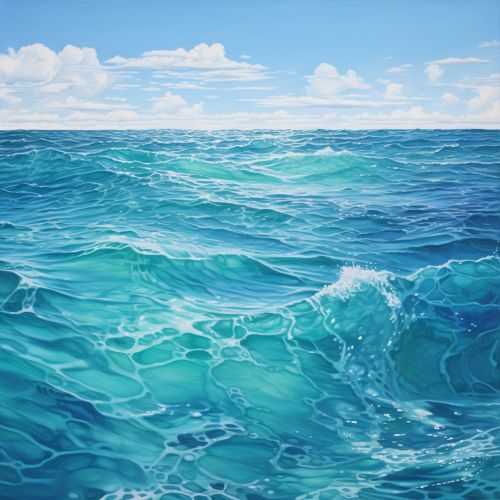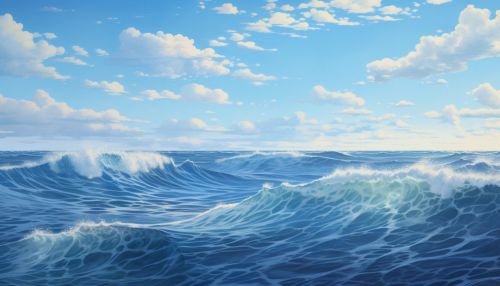Meridional Overturning Circulation
Overview
The Meridional Overturning Circulation (MOC) is a system of surface and deep currents encompassing all ocean basins. It transports heat and salt on a global scale, and connects the ocean surface with the deep ocean. The MOC is a key component of the Earth's climate system due to its ability to store and transport heat.


Mechanism
The MOC is driven by differences in temperature and salinity, which affect the density of seawater. In high latitudes, cooling of surface waters and/or evaporation increases the density of the surface water, causing it to sink. This process is known as deep water formation. The sinking water mass forms a deep current that moves towards the equator. At the same time, warmer, less dense water at the surface moves poleward, replacing the sinking water and completing the circulation.
Components
The MOC consists of several components, including the Atlantic Meridional Overturning Circulation (AMOC), the Pacific Meridional Overturning Circulation (PMOC), and the Indian Ocean Meridional Overturning Circulation (IOMOC). Each of these components has unique characteristics and plays a different role in the global climate system.
Atlantic Meridional Overturning Circulation (AMOC)
The AMOC is the best-studied component of the MOC. It is characterized by a northward flow of warm, salty water in the upper layers of the Atlantic, and a southward flow of colder water in the deep Atlantic. The AMOC plays a crucial role in the transport of heat from the tropics to the North Atlantic region.
Pacific Meridional Overturning Circulation (PMOC)
The PMOC is less well understood than the AMOC. It is characterized by a northward flow of warm water in the upper layers of the Pacific, and a southward flow of colder water in the deep Pacific. The PMOC plays a role in the transport of heat within the Pacific Ocean.
Indian Ocean Meridional Overturning Circulation (IOMOC)
The IOMOC is characterized by a northward flow of warm water in the upper layers of the Indian Ocean, and a southward flow of colder water in the deep Indian Ocean. The IOMOC plays a role in the transport of heat within the Indian Ocean.
Role in Climate
The MOC plays a critical role in the Earth's climate system. It transports heat from the equator towards the poles, helping to regulate the Earth's temperature. It also transports carbon dioxide from the atmosphere to the deep ocean, playing a role in the global carbon cycle.
Changes in MOC
Changes in the MOC can have significant impacts on global climate. For example, a slowdown or shutdown of the MOC could lead to a cooling of the North Atlantic region, changes in sea level, and shifts in precipitation patterns. Current research suggests that the MOC may be slowing down due to climate change, but more research is needed to understand the potential impacts of this change.
